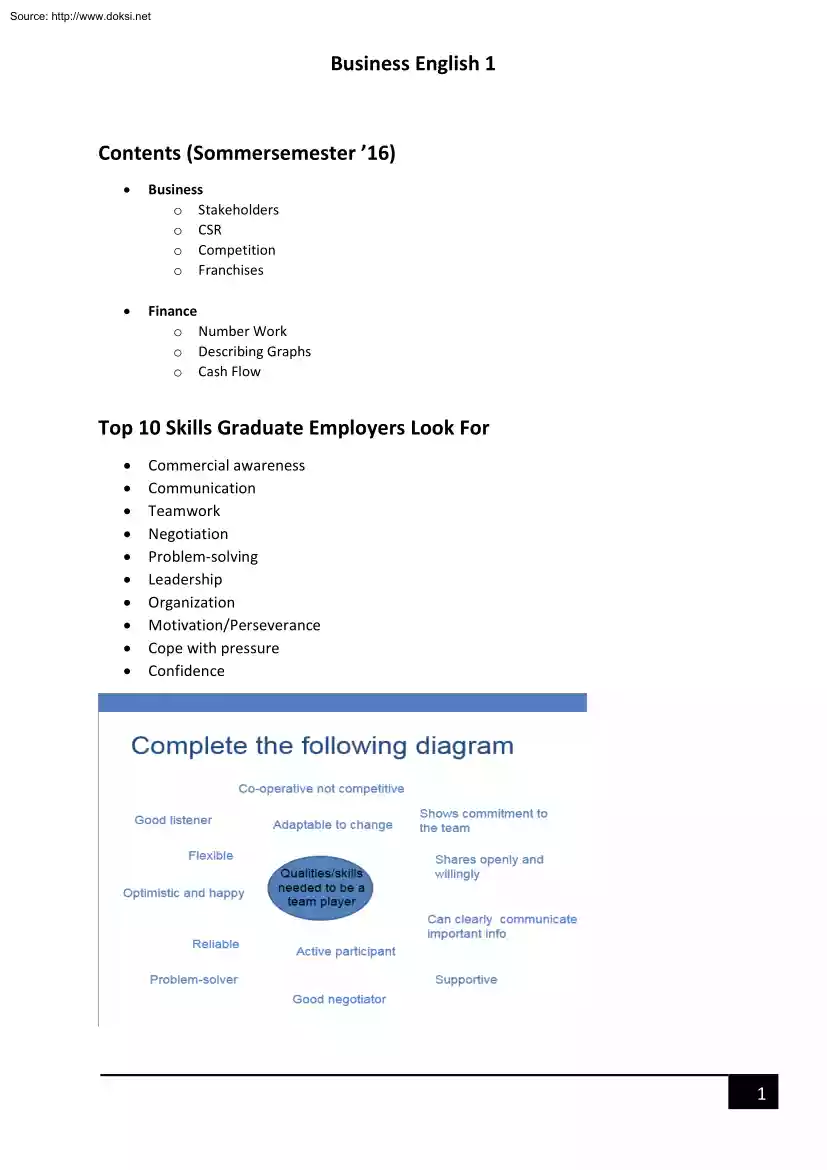Datasheet
Year, pagecount:2016, 14 page(s)
Language:English
Downloads:26
Uploaded:April 01, 2019
Size:1 MB
Institution:
-
Comments:
Attachment:-
Download in PDF:Please log in!
Comments
No comments yet. You can be the first!Content extract
Source: http://www.doksinet Business English 1 Contents (Sommersemester ’16) Business o Stakeholders o CSR o Competition o Franchises Finance o Number Work o Describing Graphs o Cash Flow Top 10 Skills Graduate Employers Look For Commercial awareness Communication Teamwork Negotiation Problem-solving Leadership Organization Motivation/Perseverance Cope with pressure Confidence 1 Source: http://www.doksinet Business English 1 Synonyms for business Company Concern Practice Firm Parent company Sole trader Limited company Organization Franchise Shop Undertaking Establishment Cooperative NGO Office Enterprise Partnership Shop Conglomerate Subsidiary Oligopoly Outfit Oligopoly Operation 2 Source: http://www.doksinet Business English 1 Size of the company Advantage/disadvantage Partnership: splits costs, split profit
Limited company: low liability Franchise: everybody knows you, all the products from the franchisor Stakeholders are groups or individuals with an interest in a business. They can affect or be affected by the decisions Stakeholders Internal Manager Employees Owners Shareholders External Local community Founders eg. Banks Customers Government Suppliers 3 Source: http://www.doksinet Business English 1 Internal- Shareholders o o o o Shareholders: Own a part of a business. Are not involved in the day-to-day running of the business. Have a right to vote at the company’s AGM. Receive a share of the profits – called a dividend. o o o o They are likely to have an interest in: Increased profits and hence dividends through such things as: Growth. Enhanced reputation. Greater efficiency. Employees o o o o Employees: Are paid by a business to carry out given roles. Are one of a company’s most important assets. Help a business
achieve its objectives. Need a range of skills relevant to their job roles e.g teamwork and problem solving Employee Interests o o o o Employees are likely to expert: Fair pay. Decent working conditions. Job security. Access to training for additional qualifications. Manager Interests In addition to the usual employee interests, managers may expect to be able to make their own decisions and have the opportunity of promotion. 4 Source: http://www.doksinet Business English 1 Customer Expectations o o o o Customers are likely to expert such things as: A product range that meets their needs. Value for money. Good quality products and customer service. A ready supply of goods and services. o And possibly: Ecologically sound/sustainable products. Government Interests o o o o The government has an interest in businesses because: It receives taxes from business profits, employee incomes and customer purchases. Business provide jobs and therefore employment
levels and benefits payments are affected. The economy is dependent on the operations of business It has a range of legislation and regulations that businesses must comply with Supplier Expectations Suppliers may provide a range of services to businesses, as well as raw materials and finished goods. o o Suppliers may expect: To be paid in a timely fashion. To receive regular orders. Local Community o o o The local community may have expectations about a company regarding: The availability of jobs. The level of pollution and congestion created. The support provided by a business regarding community projects and concerns. 5 Source: http://www.doksinet Business English 1 6 Source: http://www.doksinet Business English 1 Questions – Video: Answers: 1. Hotelling’s Model of Spatial Competition 2. In the middle of the community 3. S O S (Socially Optimal Solution) 7 Source: http://www.doksinet Business English 1 4. The point where no retail location can
improve its position by deviating from it’s current strategy. 5. a It makes some customers travel farther than necessary to purchase product b. It eliminates the possibility of a socially optimal solution c. It enables customers the ability to compare the products (price, variety, etc) with case 8 Source: http://www.doksinet Business English 1 US: 7 Aug 2016 9 Source: http://www.doksinet Business English 1 10 Source: http://www.doksinet Business English 1 11 Source: http://www.doksinet Business English 1 Corporate Social Responsibility Corporate Social Responsibility (CSR) is the responsibility a firm has to all of its stakeholders rather than just the shareholders A CSR approach will take into account societal and environmental concerns. Examples? + & - of CSR Drawbacks Additional costs. It can be argued that the main responsibilities firms have are to their shareholders Efficiency my be reduced by acting in a socially responsible
manner Benefits Improved business reputation. Ability to attract customers. Ability to recruit quality employees. Easier to attract “ethical” investors. Competitive advantage. Improved employee motivation. 12 Source: http://www.doksinet Business English 1 Poor management skills Problems Insufficient capital An inadequate business plan Reasons why startup businesses fail Bad location Overspending Lack of planning Failure to change with the times No website Overexpansion What is Cash? Cash is notes, coins & bank deposits that provide firms with the spending power to pay their bills and expenses. Cash Flow faster slower Net cash flow = cash inflow – cash outflow SME = Small Medium Enterprises (Mittelstand) 13 Source: http://www.doksinet Business English 1 Poor planning Inadequate credit control Investing too heavily in Fixed assets External factors e.g the credit crunch Causes of cash flow problems Overtrading – expanding
quicker than available funds allow Holding excessive stock So how can we improve cash flow? “the firm” diagram How? Cash Flow is the measure of money flowing in and out of your business at any given time 14
Limited company: low liability Franchise: everybody knows you, all the products from the franchisor Stakeholders are groups or individuals with an interest in a business. They can affect or be affected by the decisions Stakeholders Internal Manager Employees Owners Shareholders External Local community Founders eg. Banks Customers Government Suppliers 3 Source: http://www.doksinet Business English 1 Internal- Shareholders o o o o Shareholders: Own a part of a business. Are not involved in the day-to-day running of the business. Have a right to vote at the company’s AGM. Receive a share of the profits – called a dividend. o o o o They are likely to have an interest in: Increased profits and hence dividends through such things as: Growth. Enhanced reputation. Greater efficiency. Employees o o o o Employees: Are paid by a business to carry out given roles. Are one of a company’s most important assets. Help a business
achieve its objectives. Need a range of skills relevant to their job roles e.g teamwork and problem solving Employee Interests o o o o Employees are likely to expert: Fair pay. Decent working conditions. Job security. Access to training for additional qualifications. Manager Interests In addition to the usual employee interests, managers may expect to be able to make their own decisions and have the opportunity of promotion. 4 Source: http://www.doksinet Business English 1 Customer Expectations o o o o Customers are likely to expert such things as: A product range that meets their needs. Value for money. Good quality products and customer service. A ready supply of goods and services. o And possibly: Ecologically sound/sustainable products. Government Interests o o o o The government has an interest in businesses because: It receives taxes from business profits, employee incomes and customer purchases. Business provide jobs and therefore employment
levels and benefits payments are affected. The economy is dependent on the operations of business It has a range of legislation and regulations that businesses must comply with Supplier Expectations Suppliers may provide a range of services to businesses, as well as raw materials and finished goods. o o Suppliers may expect: To be paid in a timely fashion. To receive regular orders. Local Community o o o The local community may have expectations about a company regarding: The availability of jobs. The level of pollution and congestion created. The support provided by a business regarding community projects and concerns. 5 Source: http://www.doksinet Business English 1 6 Source: http://www.doksinet Business English 1 Questions – Video: Answers: 1. Hotelling’s Model of Spatial Competition 2. In the middle of the community 3. S O S (Socially Optimal Solution) 7 Source: http://www.doksinet Business English 1 4. The point where no retail location can
improve its position by deviating from it’s current strategy. 5. a It makes some customers travel farther than necessary to purchase product b. It eliminates the possibility of a socially optimal solution c. It enables customers the ability to compare the products (price, variety, etc) with case 8 Source: http://www.doksinet Business English 1 US: 7 Aug 2016 9 Source: http://www.doksinet Business English 1 10 Source: http://www.doksinet Business English 1 11 Source: http://www.doksinet Business English 1 Corporate Social Responsibility Corporate Social Responsibility (CSR) is the responsibility a firm has to all of its stakeholders rather than just the shareholders A CSR approach will take into account societal and environmental concerns. Examples? + & - of CSR Drawbacks Additional costs. It can be argued that the main responsibilities firms have are to their shareholders Efficiency my be reduced by acting in a socially responsible
manner Benefits Improved business reputation. Ability to attract customers. Ability to recruit quality employees. Easier to attract “ethical” investors. Competitive advantage. Improved employee motivation. 12 Source: http://www.doksinet Business English 1 Poor management skills Problems Insufficient capital An inadequate business plan Reasons why startup businesses fail Bad location Overspending Lack of planning Failure to change with the times No website Overexpansion What is Cash? Cash is notes, coins & bank deposits that provide firms with the spending power to pay their bills and expenses. Cash Flow faster slower Net cash flow = cash inflow – cash outflow SME = Small Medium Enterprises (Mittelstand) 13 Source: http://www.doksinet Business English 1 Poor planning Inadequate credit control Investing too heavily in Fixed assets External factors e.g the credit crunch Causes of cash flow problems Overtrading – expanding
quicker than available funds allow Holding excessive stock So how can we improve cash flow? “the firm” diagram How? Cash Flow is the measure of money flowing in and out of your business at any given time 14





 Just like you draw up a plan when you’re going to war, building a house, or even going on vacation, you need to draw up a plan for your business. This tutorial will help you to clearly see where you are and make it possible to understand where you’re going.
Just like you draw up a plan when you’re going to war, building a house, or even going on vacation, you need to draw up a plan for your business. This tutorial will help you to clearly see where you are and make it possible to understand where you’re going.